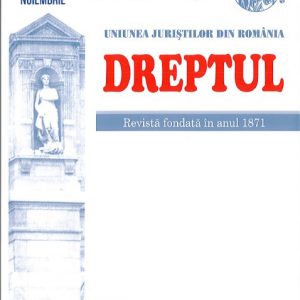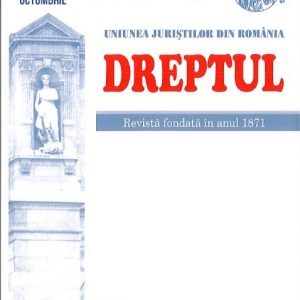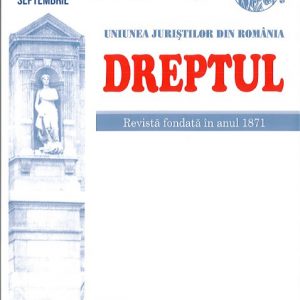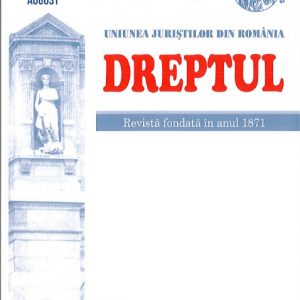-
 The study devoted to the loan contract resumes in a new form, determined, indeed, by the new Civil Code as well, this type of contract with a millenary existence, which has its roots in the Roman Age. The study emphasizes the evolution in time of the loan contract, from the essentially free loan, concluded between relatives, friends, acquaintances, a contract in which the moral precepts, including those related to religious morals, were extremely obvious, to the current loan contract, with an onerous variant, a contract that, without having lost its viability, has become extremely topical, useful. The study also emphasizes the form in which the Civil Code has insisted on regulating this type of contract, under the more or less beneficial influence of the doctrine and of the case law prior to its adoption. We tried, where we found it necessary, to go beyond the traditional patterns of the contract, as it is regarded by a significant part of the doctrine, and to accredit other points of view, being fully aware of their fragility. Last but not least, we tried to adapt the theories of some pragmatic exigencies, which, ultimately, should prevail over any constructions more related to the philosophy of law, not to the changing law.
The study devoted to the loan contract resumes in a new form, determined, indeed, by the new Civil Code as well, this type of contract with a millenary existence, which has its roots in the Roman Age. The study emphasizes the evolution in time of the loan contract, from the essentially free loan, concluded between relatives, friends, acquaintances, a contract in which the moral precepts, including those related to religious morals, were extremely obvious, to the current loan contract, with an onerous variant, a contract that, without having lost its viability, has become extremely topical, useful. The study also emphasizes the form in which the Civil Code has insisted on regulating this type of contract, under the more or less beneficial influence of the doctrine and of the case law prior to its adoption. We tried, where we found it necessary, to go beyond the traditional patterns of the contract, as it is regarded by a significant part of the doctrine, and to accredit other points of view, being fully aware of their fragility. Last but not least, we tried to adapt the theories of some pragmatic exigencies, which, ultimately, should prevail over any constructions more related to the philosophy of law, not to the changing law. -
 This study makes an examination of the legal provisions regarding the retirement of the university teaching staff. There are analyzed in a critical manner the provisions stated in Article 289 (3) and (6) of the Law on national education No 1/2011, which refers to the continuation of activity by the retired teaching staff and to the maintenance of the quality of titular in education and/or research. The author believes that the syntagms used by the mentioned texts do not receive an exemplary drafting, which may lead to different interpretations. The author also points out that, in the administrative practice, some university senates have adopted methodologies capable of annihilating the application of the legal provisions regarding the maintenance of the quality of titular of the teaching staff, solution appreciated as deeply illegal. At the end of his study, the author considers that it is necessary a better drafting of the texts relating to the maintainance in office of the university teaching staff whose teaching and scientific performance is undeniable. Likewise, de lege ferenda, it is estimated that such a possibility should be recognized only for university professors, not for all teaching staff.
This study makes an examination of the legal provisions regarding the retirement of the university teaching staff. There are analyzed in a critical manner the provisions stated in Article 289 (3) and (6) of the Law on national education No 1/2011, which refers to the continuation of activity by the retired teaching staff and to the maintenance of the quality of titular in education and/or research. The author believes that the syntagms used by the mentioned texts do not receive an exemplary drafting, which may lead to different interpretations. The author also points out that, in the administrative practice, some university senates have adopted methodologies capable of annihilating the application of the legal provisions regarding the maintenance of the quality of titular of the teaching staff, solution appreciated as deeply illegal. At the end of his study, the author considers that it is necessary a better drafting of the texts relating to the maintainance in office of the university teaching staff whose teaching and scientific performance is undeniable. Likewise, de lege ferenda, it is estimated that such a possibility should be recognized only for university professors, not for all teaching staff. -
 This article aims to examine Article 16 of the Labour Code, republished, on the requirement of drafting individual employment agreement in Romanian language, from various standpoints, such as: (i) applicable sanction for failure to conclude the individual employment agreement in Romanian language; (ii) the requirement to observe the principle of equal treatment in cases where the individual employment agreement is concluded with a foreign citizen or a national of another Member State of the European Union or the European Economic Area, concretized, inter alia, by drafting the individual employment agreement in the language of the foreign citizen; (iii) the probative value of the versions of the individual employment agreement concluded in several languages.
This article aims to examine Article 16 of the Labour Code, republished, on the requirement of drafting individual employment agreement in Romanian language, from various standpoints, such as: (i) applicable sanction for failure to conclude the individual employment agreement in Romanian language; (ii) the requirement to observe the principle of equal treatment in cases where the individual employment agreement is concluded with a foreign citizen or a national of another Member State of the European Union or the European Economic Area, concretized, inter alia, by drafting the individual employment agreement in the language of the foreign citizen; (iii) the probative value of the versions of the individual employment agreement concluded in several languages. -
 This study proposes the approach of an identified problem with regard to the regulation of the manner of applying the complementary punishment of prohibition to exercise some rights. By the analysis made within this study, the author identifies a situation of inequity which can arise in precise cases between the case of the sentenced person conditionally released from serving the punishment of life imprisonment and the case of the conditionally released person sentenced to imprisonment in detention.
This study proposes the approach of an identified problem with regard to the regulation of the manner of applying the complementary punishment of prohibition to exercise some rights. By the analysis made within this study, the author identifies a situation of inequity which can arise in precise cases between the case of the sentenced person conditionally released from serving the punishment of life imprisonment and the case of the conditionally released person sentenced to imprisonment in detention. -
 The study deals with the particularities of the human medically assisted reproduction in the cross-border private relationships. Among the artificial procreation techniques, surrogate motherhood is of present interest, as a result of the multiplication of the requests for recognition, on the territory of the forum, of the foreign judgments which establish the filiation of the child born abroad. The implications of private international law are tangential to the qualification, to the conflicts of laws in time and space and to the effectiveness of the foreign judgments. The heterogeneity of the national regulations is the main factor creating non-unitary case laws and different practices – some of them, questionable. The context of the analysis does not allow the dissociation of the artificial procreation from the higher interest of the child, so that any de lege lata or de lege ferenda solutions must be examined through the filter of this fundamental principle.
The study deals with the particularities of the human medically assisted reproduction in the cross-border private relationships. Among the artificial procreation techniques, surrogate motherhood is of present interest, as a result of the multiplication of the requests for recognition, on the territory of the forum, of the foreign judgments which establish the filiation of the child born abroad. The implications of private international law are tangential to the qualification, to the conflicts of laws in time and space and to the effectiveness of the foreign judgments. The heterogeneity of the national regulations is the main factor creating non-unitary case laws and different practices – some of them, questionable. The context of the analysis does not allow the dissociation of the artificial procreation from the higher interest of the child, so that any de lege lata or de lege ferenda solutions must be examined through the filter of this fundamental principle. -
 Starting from the situations encountered in the judicial practice, in the disputes regarding the right of the employees to the classification of their workplaces into outstanding or special conditions, and given the particularities of this fundamental right of health and safety at work, with a special view on the practical consequences which the recently pronounced decisions of the supreme court will have, decisions which have established that the employees do no longer have available the option of the action for establishing the classification of workplaces into outstanding or special conditions in contradiction with the employer, this article analyses the respect for the employees’ right of access to justice, to non-discriminatory treatment and to receive their benefits consisting of social insurance rights.
Starting from the situations encountered in the judicial practice, in the disputes regarding the right of the employees to the classification of their workplaces into outstanding or special conditions, and given the particularities of this fundamental right of health and safety at work, with a special view on the practical consequences which the recently pronounced decisions of the supreme court will have, decisions which have established that the employees do no longer have available the option of the action for establishing the classification of workplaces into outstanding or special conditions in contradiction with the employer, this article analyses the respect for the employees’ right of access to justice, to non-discriminatory treatment and to receive their benefits consisting of social insurance rights. -
 In this paper the author has proceeded to a brief examination of the European normative act adopted in March 2016, which regulates the presumption of innocence and the right to be present at the trial within the criminal procedures, both rights being circumscribed to the right to a fair trial provided in Article 6 of the European Convention on Human Rights and Fundamental Freedoms. The study also makes a comparative examination which has in view how these rights of the suspect or of the accused are protected in the Romanian law, also expressing some critical opinions as concerns the European normative act. The elements of novelty consist in the examination made, as well as in the comparative analysis and the critical opinions expressed.
In this paper the author has proceeded to a brief examination of the European normative act adopted in March 2016, which regulates the presumption of innocence and the right to be present at the trial within the criminal procedures, both rights being circumscribed to the right to a fair trial provided in Article 6 of the European Convention on Human Rights and Fundamental Freedoms. The study also makes a comparative examination which has in view how these rights of the suspect or of the accused are protected in the Romanian law, also expressing some critical opinions as concerns the European normative act. The elements of novelty consist in the examination made, as well as in the comparative analysis and the critical opinions expressed. -
 The paper analyzes the institution of suspension of the enforcement of administrative acts pursuant to Article 14 of the Law on administrative disputes No 554/2004, as amended and supplemented, from the perspective of the solutions delivered in the recent years by courts of different ranks of jurisdiction, taking into account that the serious doubt on the legality of the administrative act must be distinguished easily after a brief investigation of the appearance of the right, because, within the procedure for suspending the enforcement, by which there can only be ordered provisional measures, the prejudgment of the merits of the case is not allowed.
The paper analyzes the institution of suspension of the enforcement of administrative acts pursuant to Article 14 of the Law on administrative disputes No 554/2004, as amended and supplemented, from the perspective of the solutions delivered in the recent years by courts of different ranks of jurisdiction, taking into account that the serious doubt on the legality of the administrative act must be distinguished easily after a brief investigation of the appearance of the right, because, within the procedure for suspending the enforcement, by which there can only be ordered provisional measures, the prejudgment of the merits of the case is not allowed. -
 This paper analyses the offence of conflict of interests, as incriminated in the new Criminal Code, by comparison with the old regulation, as well as the similar incrimination in the French Criminal Code, the study being illustrated with Romanian and French case law. Likewise, the author formulates some de lege ferenda proposals in order to improve the legislation in the field.
This paper analyses the offence of conflict of interests, as incriminated in the new Criminal Code, by comparison with the old regulation, as well as the similar incrimination in the French Criminal Code, the study being illustrated with Romanian and French case law. Likewise, the author formulates some de lege ferenda proposals in order to improve the legislation in the field. -
 The Decision No 641/2014 of the Constitutional Court has radically changed the preliminary chamber procedure, transforming it into a procedure much closer to which it must be, in the opinion of the European Court of Human Rights, a criminal procedure conducted before a judge, even if it does not end in the ruling on the merits of the criminal charge, but it solves aspects of a particular importance on the merits concerned. The change has consisted in the overturning of the characters initially imagined by the legislator, overturning that has transformed the preliminary chamber procedure from a procedure conducted without the participation of the prosecutor, of the parties and of the injured party, with a limited contradictoriality between the prosecutor and the defendant and predominantly written, into a procedure involving the participation of the processual actors, completely contradictory and oral, in which it becomes possible to provide evidence on the main object of this processual phase (the legality of the evidence provided in the criminal prosecution phase and the legality of carrying out the acts by the criminal prosecution bodies). Unfortunately, the latest changes brought to the preliminary chamber by the adoption of the Law No 75/2016, although they represent a step forward in the attempt to make this criminal processual phase to comply with the elements of a fair procedure, do not follow precisely the spirit of the decision of unconstitutionality, as the legislator has still left question marks about the fairness of the procedure as regards the hypothesis that there have not been filed applications and/or pleas and as regards the limitation of the means of evidence.
The Decision No 641/2014 of the Constitutional Court has radically changed the preliminary chamber procedure, transforming it into a procedure much closer to which it must be, in the opinion of the European Court of Human Rights, a criminal procedure conducted before a judge, even if it does not end in the ruling on the merits of the criminal charge, but it solves aspects of a particular importance on the merits concerned. The change has consisted in the overturning of the characters initially imagined by the legislator, overturning that has transformed the preliminary chamber procedure from a procedure conducted without the participation of the prosecutor, of the parties and of the injured party, with a limited contradictoriality between the prosecutor and the defendant and predominantly written, into a procedure involving the participation of the processual actors, completely contradictory and oral, in which it becomes possible to provide evidence on the main object of this processual phase (the legality of the evidence provided in the criminal prosecution phase and the legality of carrying out the acts by the criminal prosecution bodies). Unfortunately, the latest changes brought to the preliminary chamber by the adoption of the Law No 75/2016, although they represent a step forward in the attempt to make this criminal processual phase to comply with the elements of a fair procedure, do not follow precisely the spirit of the decision of unconstitutionality, as the legislator has still left question marks about the fairness of the procedure as regards the hypothesis that there have not been filed applications and/or pleas and as regards the limitation of the means of evidence. -
 The impact assessment of transposing Directive 2008/99/EC on the protection of the environment through criminal law into the domestic laws of the 28 Member States of EU and of the related experiences legitimately raises the question: is the expansion of harmonization or the promotion of new instruments of application required for the achievement of the pursued objective in the future? This study is the answer offered by its signatory within The Second AIDP World Conference held in Bucharest, in the period 18–20 May 2016. The article establishes, in essence, the necessity to continue the efforts in this matter, on the one hand, by adequate measures of simplification and harmonization of the relevant regulations within the national laws, and, on the other hand, by continuing the concerns of consolidation, at EU level, of imposing the uniformisation and adoption of the instruments of protection of the environment through the criminal law.
The impact assessment of transposing Directive 2008/99/EC on the protection of the environment through criminal law into the domestic laws of the 28 Member States of EU and of the related experiences legitimately raises the question: is the expansion of harmonization or the promotion of new instruments of application required for the achievement of the pursued objective in the future? This study is the answer offered by its signatory within The Second AIDP World Conference held in Bucharest, in the period 18–20 May 2016. The article establishes, in essence, the necessity to continue the efforts in this matter, on the one hand, by adequate measures of simplification and harmonization of the relevant regulations within the national laws, and, on the other hand, by continuing the concerns of consolidation, at EU level, of imposing the uniformisation and adoption of the instruments of protection of the environment through the criminal law. -
 In the case law of the Strasbourg Court, in the cases in which Romania has been convicted for the use of undercover investigators, it has been retained the violation of the right to a fair trial, not by the importance given to the statements of the investigators, the protected witnesses or collaborators, but by the omission of the judge examining the merits to take actual steps to hear them in the trial phase. These obligations, which are directly applicable in the Romanian law system, are established, on the one hand, so that the defendant and any other party can address questions to the witnesses, debate and contest their allegations, and, on the other hand, so that the judge can hear directly the depositions of the investigators or collaborators. Despite these clear and common-sense rules arising from the mandatory case law of the European Court, the current Criminal Procedure Code has provided, in Article 103 (3), that the statements of the investigators, collaborators and protected witnesses can not contribute decisively to proving crimes, thus the interdiction is valid whether they have been heard or not by the law court.
In the case law of the Strasbourg Court, in the cases in which Romania has been convicted for the use of undercover investigators, it has been retained the violation of the right to a fair trial, not by the importance given to the statements of the investigators, the protected witnesses or collaborators, but by the omission of the judge examining the merits to take actual steps to hear them in the trial phase. These obligations, which are directly applicable in the Romanian law system, are established, on the one hand, so that the defendant and any other party can address questions to the witnesses, debate and contest their allegations, and, on the other hand, so that the judge can hear directly the depositions of the investigators or collaborators. Despite these clear and common-sense rules arising from the mandatory case law of the European Court, the current Criminal Procedure Code has provided, in Article 103 (3), that the statements of the investigators, collaborators and protected witnesses can not contribute decisively to proving crimes, thus the interdiction is valid whether they have been heard or not by the law court.
